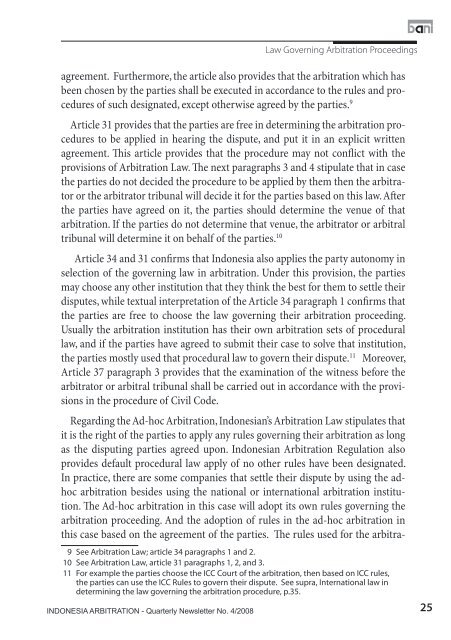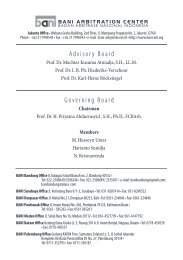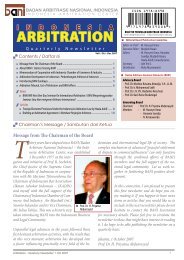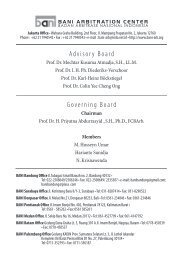indonesia arbitration - Bani
indonesia arbitration - Bani
indonesia arbitration - Bani
You also want an ePaper? Increase the reach of your titles
YUMPU automatically turns print PDFs into web optimized ePapers that Google loves.
agreement. Furthermore, the article also provides that the <strong>arbitration</strong> which has<br />
been chosen by the parties shall be executed in accordance to the rules and procedures<br />
of such designated, except otherwise agreed by the parties. 9<br />
Article 1 provides that the parties are free in determining the <strong>arbitration</strong> procedures<br />
to be applied in hearing the dispute, and put it in an explicit written<br />
agreement. This article provides that the procedure may not conflict with the<br />
provisions of Arbitration Law. The next paragraphs and 4 stipulate that in case<br />
the parties do not decided the procedure to be applied by them then the arbitrator<br />
or the arbitrator tribunal will decide it for the parties based on this law. After<br />
the parties have agreed on it, the parties should determine the venue of that<br />
<strong>arbitration</strong>. If the parties do not determine that venue, the arbitrator or arbitral<br />
tribunal will determine it on behalf of the parties. 10<br />
Article 4 and 1 confirms that Indonesia also applies the party autonomy in<br />
selection of the governing law in <strong>arbitration</strong>. Under this provision, the parties<br />
may choose any other institution that they think the best for them to settle their<br />
disputes, while textual interpretation of the Article 4 paragraph 1 confirms that<br />
the parties are free to choose the law governing their <strong>arbitration</strong> proceeding.<br />
Usually the <strong>arbitration</strong> institution has their own <strong>arbitration</strong> sets of procedural<br />
law, and if the parties have agreed to submit their case to solve that institution,<br />
the parties mostly used that procedural law to govern their dispute. 11 Moreover,<br />
Article 7 paragraph provides that the examination of the witness before the<br />
arbitrator or arbitral tribunal shall be carried out in accordance with the provisions<br />
in the procedure of Civil Code.<br />
Regarding the Ad-hoc Arbitration, Indonesian’s Arbitration Law stipulates that<br />
it is the right of the parties to apply any rules governing their <strong>arbitration</strong> as long<br />
as the disputing parties agreed upon. Indonesian Arbitration Regulation also<br />
provides default procedural law apply of no other rules have been designated.<br />
In practice, there are some companies that settle their dispute by using the adhoc<br />
<strong>arbitration</strong> besides using the national or international <strong>arbitration</strong> institution.<br />
The Ad-hoc <strong>arbitration</strong> in this case will adopt its own rules governing the<br />
<strong>arbitration</strong> proceeding. And the adoption of rules in the ad-hoc <strong>arbitration</strong> in<br />
this case based on the agreement of the parties. The rules used for the arbitra-<br />
9 See Arbitration Law; article 4 paragraphs and 2.<br />
0 See Arbitration Law, article paragraphs , 2, and .<br />
For example the parties choose the ICC Court of the <strong>arbitration</strong>, then based on ICC rules,<br />
the parties can use the ICC Rules to govern their dispute. See supra, International law in<br />
determining the law governing the <strong>arbitration</strong> procedure, p. 5.<br />
INDONESIA ARBITRATION - Quarterly Newsletter No. 4/2008<br />
Law Governing Arbitration Proceedings







